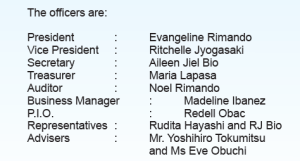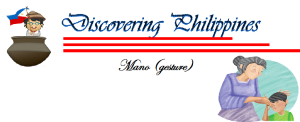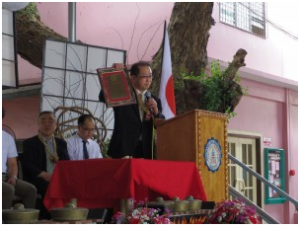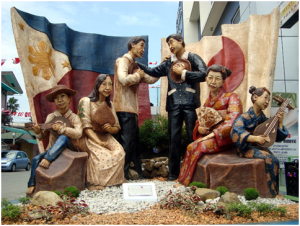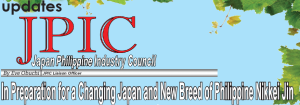
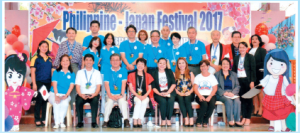
Part 1 of this article quoted the saying of a wise man that goes this way—“Do not be afraid of changes but be sensitive to something changing.” But what if changes or things that changes, changed in a blink of an eye? how then to cope up with changes with composure and finesse? Indeed, the 1st and 2nd quarter of 2017 was a very busy time for Japan Philippine Industry Council with so many activities, programs, meetings to attend to, endless movement of Nikkei jins in Japan whether or not the outcome is good. On July 2, 2017, was the JPIC Convention held in Naha, Okinawa Japan. There were 15 members who attended the convention. Election of officers was held. The new officers for 2017–2019 are
as follows:
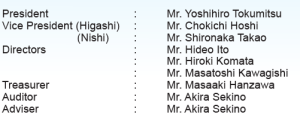
August 2, 2017, paid a courtesy visit to Consul and Counselor Toshio Kawauchi of the Japanese Embassy in Manila. The meeting was very cordial and fruitful as some important matters about Nikkei jins as well as Japanese living in the Philippines were discussed. On the same date, had a fellowship dinner with Federation President Mallari, PNJK President Escovilla, and PNJK staff at Café Tavera in Davao City.

On August 3–4, 2017, conducted a meeting with the 2017–2018 JPIC Scholars and parents at PNJKIS main campus and Calinan campus respectively. The scholars gave their “Thank You Cards” and prepared a program for Tokumitsu Shacho.
On August 4, 2017, met with the 4th generation Nikkei jins of Manila Central Luzon Nippi, Inc. Thereafter, had a meeting with Manila Nippi President Stephen Buni, Atty. Pacsi, and Mr. Darauay and Mr. Rogel Garidan and PNLSC staff Ms Marie and Ms. Emie.
Matters discussed were about Manila Nikkei jins concerns and problems and profile, reliability and stability of some JPIC members.
Tokumitsu kaichou assured Manila Nippi that all the JPIC members are of good moral and financial standing and all members are credible and sincere in their efforts to provide the Nikkei jins with good source of livelihood in Japan.
On August 22, 2017, another JPIC member Triumph Co., Ltd. President. Masaaki Hanzawa and Mr. Russell Rowe Montajes with Eve paid a courtesy visit to Consul and Counselor Toshio Kawauchi.
On October 11, 2017, JPIC members headed by Tokumitsu Kaicho, Hoshi Shacho, Sekino Kaicho, Komata Jyomu, Ohtsubo Shacho, Beulah San, Kanazume Kaicho, Yoshimoto San attended the 25th PNJK-IS Founding Anniversary. JPIC presented the school with monetary gift.
On October 22, 2017, was the JPIC Directors’ Meeting at PNLSC Yotsuya, Tokyo, Japan. Fellowship Dinner at Hokkaido Yotsuya Restaurant followed afterwards. In attendance were JPIC Tokumitsu Kaicho, Sekino Kaicho, Komata Jyoumu, Kawagishi Shacho and Eve, Atty. Kawai, Atty. Mochizuki, Mr. Inomata, Ms. Ishii, Rengokai President Mallari, PNJK President Ecovilla, Ms. Apigo, Ms. Tagud, Ms. Iwamoto, NIPPI President Buni, Mr. Darauay, Mr. Garidan.
October 23–25, 2017, attended the 58th Kai Gai Nikkei Tai Kai with PN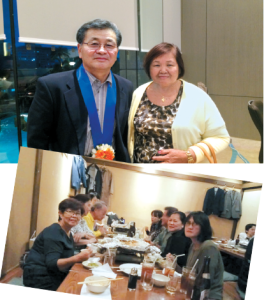 JK-Davao and NIPPIManila delegates.
JK-Davao and NIPPIManila delegates.
A Welcome Party was hosted by the Imperial Family and attended by no less than their Royal Highness Prince Akishino and Princess Kiko.
In the evening of 24th was a dinner hosted by MOFA headed by the new Foreign Minister H.E Taro Kono.
November 4, 2017, Tokumitsu Kaicho, Ito Shacho and Eve attended the Philippine Nikkei jin Kai Rengokai, Inc. General Assembly at Pan Pacific Hotel, Manila followed by the PNLSC, Inc. Management Meeting.
Atty. Kawai proudly announced that PNLSC was able to achieve 209 approved shuseki within 5 years. Indeed, an achievement worthy of a grand celebration.
“おつかれさまです!”
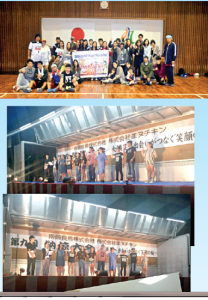 Four years ago, the Federation President Mallari together with PNJK President Escovilla and JPIC Coordinator Eve went to Japan for a courtesy visit to the different JPIC companies and to meet the nikkei jins sponsored by the companies.
Four years ago, the Federation President Mallari together with PNJK President Escovilla and JPIC Coordinator Eve went to Japan for a courtesy visit to the different JPIC companies and to meet the nikkei jins sponsored by the companies.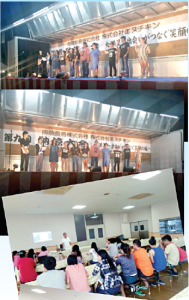 on the following: to serve as the support system to its members especially during hard times, to help members to learn the Japanese language, understand and appreciate Japanese culture at the same time promote Filipino culture to the Japanese people and most specially to promote camaraderie among its members and company staff, administration and people of the community.
on the following: to serve as the support system to its members especially during hard times, to help members to learn the Japanese language, understand and appreciate Japanese culture at the same time promote Filipino culture to the Japanese people and most specially to promote camaraderie among its members and company staff, administration and people of the community.